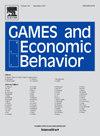满足合理假设的投票权递推衡量标准
IF 1
3区 经济学
Q3 ECONOMICS
引用次数: 0
摘要
经典的投票权衡量标准基于参与者在投票配置或分票中的果断性或完全因果效力。我们从这一经典方法出发,设计了另一种递归度量方法。我们通过基于合理公理的公理特征描述,以及对其含义的两种互补解释,来激发这种测量方法:首先,我们将这种测量方法解释为代表的不是玩家在投票结构中起决定性作用的概率,而是其在子集网格(我们通过子集网格来代表投票结构)中的投票配置的均匀随机行走中起决定性作用的预期概率;其次,我们将其解释为代表玩家的预期功效,从而纳入了部分功效而不仅仅是完全因果功效的概念。我们通过证明我们的方法满足任何合理的投票方法都应满足的一系列假设,即等差数、虚数、支配地位、捐赠、最小力量集团和争吵假设,来巩固我们的方法。本文章由计算机程序翻译,如有差异,请以英文原文为准。
A recursive measure of voting power that satisfies reasonable postulates
The classical measures of voting power are based on players' decisiveness or full causal efficacy in vote configurations or divisions. We design an alternative, recursive measure departing from this classical approach. We motivate the measure via an axiomatic characterisation based on reasonable axioms and by offering two complementary interpretations of its meaning: first, we interpret the measure to represent, not the player's probability of being decisive in a voting structure, but its expected probability of being decisive in a uniform random walk from a vote configuration in the subset lattice (through which we represent the voting structure); and, second, we interpret it as representing a player's expected efficacy, thereby incorporating the notion of partial and not just full causal efficacy. We shore up our measure by demonstrating that it satisfies a set of postulates any reasonable voting measure should satisfy, namely, the iso-invariance, dummy, dominance, donation, minimum-power bloc, and quarrel postulates.
求助全文
通过发布文献求助,成功后即可免费获取论文全文。
去求助
来源期刊

Games and Economic Behavior
ECONOMICS-
CiteScore
1.90
自引率
9.10%
发文量
148
期刊介绍:
Games and Economic Behavior facilitates cross-fertilization between theories and applications of game theoretic reasoning. It consistently attracts the best quality and most creative papers in interdisciplinary studies within the social, biological, and mathematical sciences. Most readers recognize it as the leading journal in game theory. Research Areas Include: • Game theory • Economics • Political science • Biology • Computer science • Mathematics • Psychology
 求助内容:
求助内容: 应助结果提醒方式:
应助结果提醒方式:


